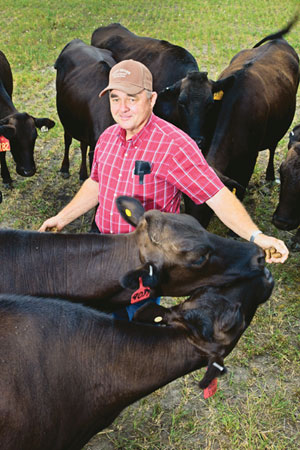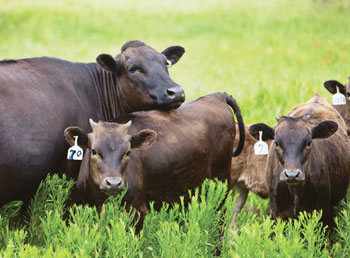
Ralph Lee with his Wagyu cattle
Lifelong cattleman Ralph Lee knows a good thing when he sees it.
And driving through the pastures of his Central Texas ranch, he sees what he believes is the answer to providing high-quality premium beef, in the form of Wagyu cattle.
For the past four years, Lee has advocated passionately for the breed, introducing Wagyu genetics into his own herd and working to promote Wagyu cattle in the United States.
“I was convinced I was doing the right thing from the beginning and am even more convinced today,” Lee says. As evidenced by his short four-year rise from novice breeder to Texas Wagyu Association and American Wagyu Association director, Lee’s enthusiasm and commitment are obvious.
Finding a Way to Market High-Quality Beef
The word Wagyu refers to all Japanese beef cattle (‘Wa’ means Japanese or Japanese-style, and ‘gyu’ means cattle), and the difference of their beef lies in the marbling, the white flecks of fat interspersed throughout the muscles.
While most meat-eating Americans are familiar with USDA Prime–designated beef, Japanese beef is graded on a numeric scale from 1 to 12. On that scale, USDA Prime beef rates between 5 and 6, Lee says. Furthermore, research at Washington State University has shown that Wagyu beef has about a 2:1 ratio of monounsaturated fatty acid to saturated fatty acid compared with that of British cattle breeds, which are more commonly slaughtered for beef in the United States. According to Lee, the marbling has a different texture to it and a much lower melting point of about 75 degrees. He adds that it also has high amounts of oleic acid, which is commonly found in “heart healthy” nuts, such as almonds and pecans.
While Wagyu cattle in the United States were originally brought over in the 1970s to be raised for the Japanese market, most of the Wagyu beef slaughtered in the U.S. today remains here to be served in some of the country’s top steakhouses.

It’s the taste of the beef that Lee says persuaded him to invest in the breed. He had read about Wagyu cattle in numerous agricultural publications and says he felt that Wagyu beef was the answer to what he thought were unsatisfactory beef options in the marketplace.
Once in the business, Lee says he knew that Texas breeders needed a way to sell their animals as a group, so he discussed the idea of starting a state breed association with some other ranchers in Central Texas. They all agreed that the need was there — and suggested that Lee organize and lead the effort. He hosted the first informational meeting at a local sale barn and served as the association’s first president from 2009 to 2011.
“When I held the first meeting, I had 75 to 80 people show up,” he recalls. “They were excited about it and still are. We have a good group of people and a good board of directors, which makes it work.”
The Texas Wagyu Association has hosted an annual production sale since 2010, and this year’s sale in April 2012 included 65 lots of cattle that averaged $5,405 each — up 25 percent from the 2011 sale. Most Wagyu cattle are sold by private treaty, but Lee believes that the sale is an important tradition to uphold.
Lee says that the Texas association’s membership extends to other states, as well as to Australia, Canada and Mexico, but that it was established to work under American Wagyu Association guidelines and help the national organization — never to replace it.
Why it Pays to Have a Plan
While Lee will proudly recount the strong points of Wagyu cattle and their beef, he is also a realist and says he knows that the niche breed has its downsides. Lee acknowledges that Wagyu cattle require more startup costs and advises those interested in trying the breed to do their research.
“I love the cattle business, and I would like to be able to tell my grandkids that they can take over the ranching operation and make a really good living at it.”– Ralph Lee
“These aren’t cattle you can just take to the sale barn,” Lee says. “You’ve got to have a plan for who you are going to sell them to and how you are going to market them. I’ll talk to beginners and show them around my herd, and tell them what I am doing and why I am doing it, share some of the mistakes I’ve made and some of the things I would recommend them doing.”
Lee’s herd includes both full-blood Wagyu cattle and Wagyu-Angus crossbred cattle. He also uses some of his Angus and Brangus heifers as recipient cows, or surrogates, for Wagyu embryos. His calves are grain-fed in a feedlot, and he says he knows his markets well enough that he can secure a buyer for them before they begin a feeding program. As of early spring, he had 800 head in feedlots. Lee recently began experimenting with Wagyu-Holstein crosses, which he is expecting to result in a consistent, high-marbled product.
Progressing in Partnership With Texas Land Bank
Lee is a customer of Texas Land Bank’s Lampasas office and took out his first real estate loan with the lending co-op in 1978. Macy Blankenship, office branch manager and Lee’s loan officer, says she is impressed with the direction he has taken his operation in the past four years.
“It’s really impressive what he has been able to accomplish in such a short period of time,” Blankenship says. “The progress he has made is reflective of his strong management abilities, and he’s sharp as a tack when it comes to making smart business decisions.”
Two of Lee’s three children are involved with the ranch, and he says that his three grandchildren love to visit. He admits that in addition to helping him put quality beef into the marketplace, his involvement with Wagyu cattle contributes to another important goal — enabling him to pass down the lifestyle he loves to the next generations.
“I love the cattle business, and I would like to be able to tell my grandkids that they can take over the ranching operation and make a really good living at it,” Lee says. “Before the Wagyus, there is no way I could have told them that.”
– Staff
For more information about the Texas Wagyu Association, visit their website.